
Why kids lose their sense of wonder, according to Carl Sagan
The curiosity of children is a national resource. Adults destroy it.
- As celebrated science communicator Carl Sagan noticed, between first grade and twelfth grade, kids often lose their sense of scientific wonder.
- In his book, The Demon Haunted World, Sagan placed most of the blame for this unfortunate trend on indifferent adults, who all-too-often chide children for their boundless curiosity.
- “Bright, curious children are a national and world resource,” Sagan wrote. “They need to be cared for, cherished, and encouraged.”
Link: https://bigthink.com/thinking/why-kids-lose-wonder-carl-sagan/

Parents, instill in your children a “growth mindset” to help them succeed in school and beyond
Intelligence is not fixed but fluid. A growth mindset allows our brains to flourish while lowering our stress levels.
- People with a growth mindset view intelligence as fluid, something that grows and develops throughout one’s life.
- In contrast, a fixed mindset views intelligence as predetermined and success the realm of the naturally gifted.
- Research shows that a growth mindset furnishes many lifelong advantages, such as improving learning outcomes and offsetting stress.
Link: https://bigthink.com/smart-skills/parents-kids-growth-mindset/
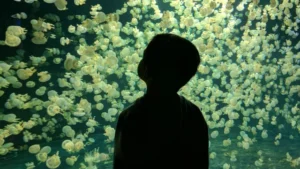
Want to be more curious? Experts recommend these 5 habits
Despite a reputation for catastrophe and cat killings, curiosity is a beneficial drive that improves our lives and well-being.
- Many animals express curiosity, but humans are an intensely curious bunch.
- Curiosity not only drives artistic and scientific pursuits, but also introspection and personal growth.
- To be more curious, determine what intrinsically motivates you, how to ask better questions, and how to make curiosity its own reward.
Link: https://bigthink.com/the-learning-curve/5-habits-increase-curiosity/

Teens can have excellent executive function — just not all the time
Adolescents’ brains are highly capable, if inconsistent, during this critical age of exploration and development. They are also acutely tuned into rewards.
Link: https://bigthink.com/neuropsych/teenagers-executive-function/

7 brain-boosting board games to help kids think outside the box
Like sneaking veggies into dessert, these board games teach STEM, strategy, and executive functions through the joys of play.
- Many popular board games offer little more than colorful distractions, lacking both thoughtful design and quality learning principles.
- However, the recent board game renaissance has resulted in a host of new games that teach children a range of hard and soft skills through play.
- We look at some of the best new board games and offer tips to find even more.
Link: https://bigthink.com/neuropsych/board-games-for-kids/

3 great untruths to stop telling kids — and ourselves
Kids are fragile. They should trust their feelings. The world is a battle between good and evil. We should stop repeating these untruths.
- According to prominent social psychologist Jonathan Haidt, there are three great untruths currently being taught to our kids: (1) “What doesn’t kill you makes you weaker”; (2) “Always trust your feelings”; and (3) “Life is a battle between good people and evil people.”
- Reinforcing these misinformed dogmas through parenting and education is leaving future generations ill-prepared to thrive in a complex, interconnected world.
- According to Haidt, the reality is more nuanced: “Children are anti-fragile, we are all prone to motivated reasoning and confirmation bias, and we’re all prone to tribalism and black-and-white thinking.” We should be raising and educating kids based on those principles.
Link: https://bigthink.com/thinking/untruths-to-stop-telling-kids/

Want to remember more? Memorize less.
To make a ton of information stick in your mind, you have to make it chunky.
- It’s now common knowledge that people’s memories can only hold seven or so pieces of information at a time.
- However, chunking is a memory loophole that allows us to compress large amounts of information into manageable pieces.
- People who seem to have extraordinary memories, such as expert chess players, really use chunking to recognize familiar patterns and sequences.
Link: https://bigthink.com/neuropsych/want-to-remember-more-memorize-less/
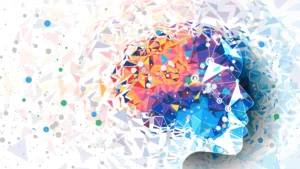
Learning how to learn
We forget how unnatural a lot of formal education is. “Learning how to learn” requires bridging the gap between the abstract and the natural.
- We are evolutionarily and biologically primed to learn. All living things must adapt to their environment and develop competencies unique to their species.
- The education system employs a different kind of learning. It is secondary and used in an alien and remote environment: the school.
- Learning how to learn involves bridging the gap between this “secondary learning” and our “primary learning.”
Link: https://bigthink.com/thinking/on-learning-how-to-learn/

Busting the learning styles myth: Why learning generalists perform best
Learning styles are supposed to help learners take ownership of their education, but research doesn’t back up this well-intentioned myth.
- A large percentage of the population believe they were born with an innate learning style.
- Studies show no evidence for learning styles, and many researchers fear they may discourage proven educational practices.
- People, especially children, are learning generalists who should engage in many different methods of learning.
Link: https://bigthink.com/the-learning-curve/learning-styles-myth/
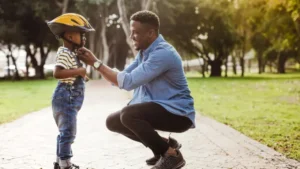
Help your kids, but not too much, says new Stanford study
Flying that helicopter too low is counterproductive.
- A new study at Stanford finds that giving too much direction to children can be counterproductive.
- Children that are given too much advice display more difficulty regulating their behavior and emotions at other times.
- The researchers suggest a balance between being involved while allowing children to figure things out on their own.
Link: https://bigthink.com/neuropsych/helicopter-parenting/

Want students to cheat less? Science says treat them justly
Students who think the world is just cheat less, but they need to experience justice to feel that way.
- Students in German and Turkish universities who believed the world is just cheated less than their pessimistic peers.
- The tendency to think the world is just is related to the occurence of experiences of justice.
- The findings may prove useful in helping students adjust to college life.
Link: https://bigthink.com/neuropsych/justice-cheating/

Why schools should not teach general critical-thinking skills
Schools have become captivated by the idea that students must learn a set of generalized critical-thinking skills to flourish in the contemporary world.
Link: https://bigthink.com/neuropsych/general-critical-thinking/
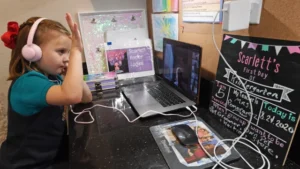
Remote education is decreasing anxiety, increasing wellbeing for some students
A recent NIHR report found that students with previously low connectedness scores saw improvement in well-being and eased anxiety.
- With coronavirus resurging in Europe and the United States, parents are worried about their children’s well-being and mental health.
- A report from the U.K.’s NIHR extends some hope; it found that students’ mental health is improving while remote learning.
- Parents will continue play an important role in supporting their children’s mental health.
Link: https://bigthink.com/neuropsych/remote-education/

Even in the digital age, libraries are an investment in children
Investments in public libraries are a long-term investment in children and communities.
- Many people would assume that as the digital age grows, library usage would shrink. But contrary to that, circulation of adult and children’s physical books grew in the 2000s, and public libraries remain a top cultural activity in the U.S.
- Public libraries are more than hubs of information. Many offer services ranging from job assistance and health insurance registration to kids’ read-alouds and even bike tune-ups. Libraries are also one of the few public spaces where people can freely access the internet.
- Researchers have found that investment in public libraries leads to community benefits.
Link: https://bigthink.com/high-culture/library-benefits/

Is computer code a language or math? MIT study uses brain scans for answers
How our brains interpret computer code could impact how we teach it.
- Computer coding is a relatively new skill, so our brains can’t have specialized areas for it from birth.
- The question of how we process computer code, as a language or as math, could impact how we teach the subject.
- A new MIT study suggests our brains treat it as its own special topic.
Link: https://bigthink.com/neuropsych/coding-language-brain/
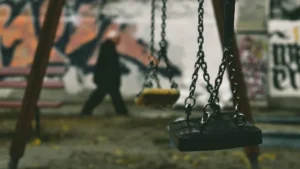
How socioeconomic status negatively impacts children’s brains
A new study shows how poor children are negatively impacted neurologically.
- Children in poor neighborhoods exhibit abnormal activation of motivational circuits in their brains.
- The neurological impact increases the likelihood of criminal behavior and substance abuse later in life.
- Researchers suggest focusing on shaping the environment to set up the child for success.
Link: https://bigthink.com/the-present/socioeconomic-status-mental-health/

Why the most successful students have no passion for school
Passion makes challenges enjoyable, but it may have little use in schools.
Link: https://bigthink.com/neuropsych/passion-for-school/

The way we teach science misses something key: Human context
Why do we deprive students of the historical and cultural context of science?
- The teaching of science must and can be humanized at all levels, from nonscience courses to technical advanced courses.
- By teaching science only as a technical endeavor, we deprive students and future scientists of a more inclusive worldview where science is seen as part of our human need to make sense of the world.
- The challenges we face in the modern world call for an engagement of the sciences and the humanities that starts in the classroom and becomes an essential aspect of the public sphere.
Link: https://bigthink.com/13-8/how-to-teach-science/

Just 1 month in greener play areas could boost kids’ immune systems, study says
The researchers say their findings support the idea that low biodiversity in modern living environments could lead to “uneducated” immune systems.
Link: https://bigthink.com/health/outdoor-play-immune-systems/

Brain study finds that humans are born wired for reading letters and words
The area of the brain that recognizes letters and words is ready for action right from the start.
- There’s an area of the brain specializing in the recognition of letters and words.
- Neuroscientists wonder how this faculty develops since it would not be a trait associated with survival.
- fMRI scans reveal that this region is already connected to the brain’s language centers in newborns.
Link: https://bigthink.com/neuropsych/brain-wired-for-reading-at-birth/
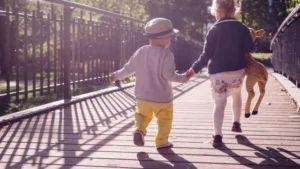
Children know what makes a leader more than some adults
Even kids get that a real leader puts others’ interests first.
- 5-year-olds recognize social hierarchies and are aware when others don’t contribute their fair share.
- Children of this age consider someone a leader only when they sacrifice toward achieving the common goal.
- “Leaders” who take more than they give are considered unacceptable to young children.
Link: https://bigthink.com/the-present/leaders-responsible-children/

Teen popularity linked to increased depression in adolescence, decreased depression in adulthood
The results of this study showed depressive symptoms being highest in adolescence, declining in early adulthood and then climbing back up again into one’s early 30s.
- A 2020 Michigan State University study examined the link between teen social networks and the levels of depression later in life.
- This study used data from the National Longitudinal Study of Adolescent to Adult Health, specifically targeting social network data. The results showed depressive symptoms being highest in adolescence and declining in early adulthood, then climbing back up again into one’s early 30s.
- There are several ways you can attempt to stay active and socially connected while battling depression, according to experts.
Link: https://bigthink.com/neuropsych/teen-depression-popularity/
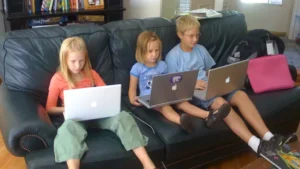
Two-thirds of parents say technology makes parenting harder
Parental anxieties stem from the complex relationship between technology, child development, and the internet’s trove of unseemly content.
- Today’s parents believe parenting is harder now than 20 years ago.
- A Pew Research Center survey found this belief stems from the new challenges and worries brought by technology.
- With some schools going remote next year, many parents will need to adjust expectations and re-learn that measured screen usage won’t harm their children.
Link: https://bigthink.com/the-present/parents-and-technology/

How “thinking about thinking” can help children in school and in life
Teaching your child metacognitive techniques can improve their learning and life skills.
- Metacognition is the idea of “thinking about how we think” – this can give us insight into our feelings, needs and behaviors that allow us to adapt and grow.
- Metacognition can (and should) be taught from an early age to allow for students to do their best in school and in life.
- Simple forms of metacognitive thinking techniques can be taught at home and in the classroom.
Link: https://bigthink.com/neuropsych/metacognitive-strategies-in-children/

‘Power posing’ also boosts confidence in children, new study shows
The study provides initial evidence that open, strong postures can improve children’s mood and self-esteem.
- Power posing grew in prominence in 2012 after social psychologist Amy Cuddy’s famous TED Talk.
- A new study found that power posing correlates with a positive boost in children’s self-esteem and confidence.
- The debate over power posing remains heated in psychological circles, but there are plenty of other ways parents and teachers can boost children’s self-esteem.
Link: https://bigthink.com/neuropsych/power-posing/

Our schools are built differently. That’s how we’re weathering this pandemic.
‘Know thy students’ is the principle that can change the form of education, worldwide.
- During the coronavirus pandemic, students in close to 200 Big Picture Learning (BPL) schools worldwide have continued their education, thanks to BPL’s unique school design.
- At BPL, each student is part of a small learning community of 15-20 students called an Advisory, led by a teacher called an Advisor. Students have community mentors, do off-campus internships, and even tackle college courses.
- Each Advisor truly knows the students in their Advisory. These close ties have allowed learning at BPL to respond and adapt to the challenges presented by coronavirus.
Link: https://bigthink.com/the-present/big-picture-learning/
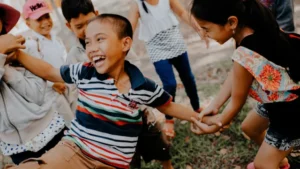
For a child, being carefree is intrinsic to a well-lived life
Do adults need to be more carefree, in order for their lives to go well?
Link: https://bigthink.com/neuropsych/carefree-childhood/

Screen time isn’t hurting kids socially, study finds
Despite being raised in a screen-lit world, today’s children make and maintain friendships as well as past generations.
- The dominate cultural assumption claims screen time devastates children’s social skills.
- A recent study in the American Journal of Sociology suggests today’s children are as socially skilled as the preceding peers.
- Parents need to set screen limits, but research shows they should set limits for themselves, too.
Link: https://bigthink.com/the-present/screen-time-for-kids/

Home libraries boost child cognition. These are the best books for every age.
Early reading experiences play an important role in brain development.
- Recent studies have shown that children who grow up with books at home have increased literacy, numeracy, and information communication technology skills in adulthood.
- Bookstores and libraries are great, but according to researchers, early exposure at the parental home matters because “books are an integral part of routines and practices that enhance lifelong cognitive competencies.”
- While age doesn’t necessarily dictate reading level, here are titles suitable for children from a few months old up to 17 years.
Link: https://bigthink.com/the-present/best-books-for-all-ages/

I was homeschooled for 8 years: Here’s what I recommend
What subjects and ideas do you discuss with your friends when you see them?
Link: https://bigthink.com/neuropsych/homeschooling-tips/

Children’s career ambitions are lagging behind the new world of work
“Too many teenagers are ignoring or are unaware of new types of jobs that are emerging.”
Link: https://bigthink.com/the-present/childrens-dream-jobs/

Nature-deficit disorder: What kids lose by not experiencing the outdoors enough
Research explains the positive impact and health benefits of children spending more time in nature.
- “Nature-deficit disorder” is the term coined by author Richard Louv, to help put a name to the ever-growing problems associated with children spending less time in nature.
- Research has provided evidence that prove Richard Louv’s theories on the importance of nature to the human body and mind. This research proves a link between time spent in nature and improvements in areas such as motivation, problem-solving and self-esteem.
- There are many simple, actionable ways parents and educators of young children can incorporate nature back into the lives of children both in school and at home, such as starting outdoor playgroups or reintegrating nature into the school curriculum.
Link: https://bigthink.com/neuropsych/nature-deficit-disorder-richard-louv/

7 (more) board games to help kids think big
We catalogue seven more board games to teach children science, problem-solving, and even foster their creativity.
- The number of board games being released each year is unprecedented.
- Among the deluge of new and interesting titles, many can help develop life-critical skills, such as creativity, problem solving, and lateral thinking.
- We look at seven more board games that help teach children to think big.
Link: https://bigthink.com/neuropsych/board-games-for-kids-2643189514/

Lying to your kids could make them more dishonest and less well-adjusted as adults
“I’ve got Santa on the phone and he says he’s not coming unless you go to bed now.”
Link: https://bigthink.com/neuropsych/lying-to-children/

Using fidget spinners may actually impede learning
Are the concentration benefits just a marketing ploy?
Link: https://bigthink.com/neuropsych/fidget-spinners/
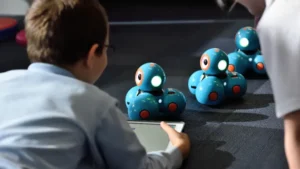
10 must-have STEM toys that are backed by science
A gift guide of the hottest educational toys for your budding scientist, engineer, or mathematician.
- STEM toys help children build important science, technology, engineering, and math skills.
- From fossil kits to programmable robots, there are lots of great options for kids of all ages.
- This STEM gift guide will set you on the right path this holiday season.
Link: https://bigthink.com/the-present/stem-toys/

10 video games to help kids think big
We found 10 video games that kids will love (and they’ll secretly be learning, too).
- Educational video games endure a gimcrack reputation for being boring.
- We list 10 games that can help players learn and may improve their cognitive skills.
- The American Psychological Association recognizes other benefits to playing video games, including social and motivational ones.
Link: https://bigthink.com/neuropsych/kids-video-games/

Parents who lie to their kids raise adult liars
A new study finds that casually fibbing to children results in lifelong issues.
- For simplicity and speed, parents may employ untruths as conversation-enders and to coerce desirable behavior using empty threats.
- Telling kids not to lie while modeling contrary behavior is, not surprisingly, a problem.
- Lying as an adult is just one of the issues lied-to children exhibit as grownups.
Link: https://bigthink.com/neuropsych/parents-who-lie/
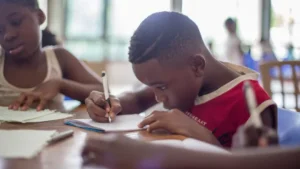
Why we need to praise kids’ teachability — not just their ability
In the fight between talent and hard work, hard work usually wins.
- Our education system often caters to identifying and supporting gifted children.
- However, an excessive focus on giftedness may not be the best approach for educators.
- Instead, we may want to emphasize the role of growth and teachability in future success.
Link: https://bigthink.com/the-present/school-growth-versus-fixed/

